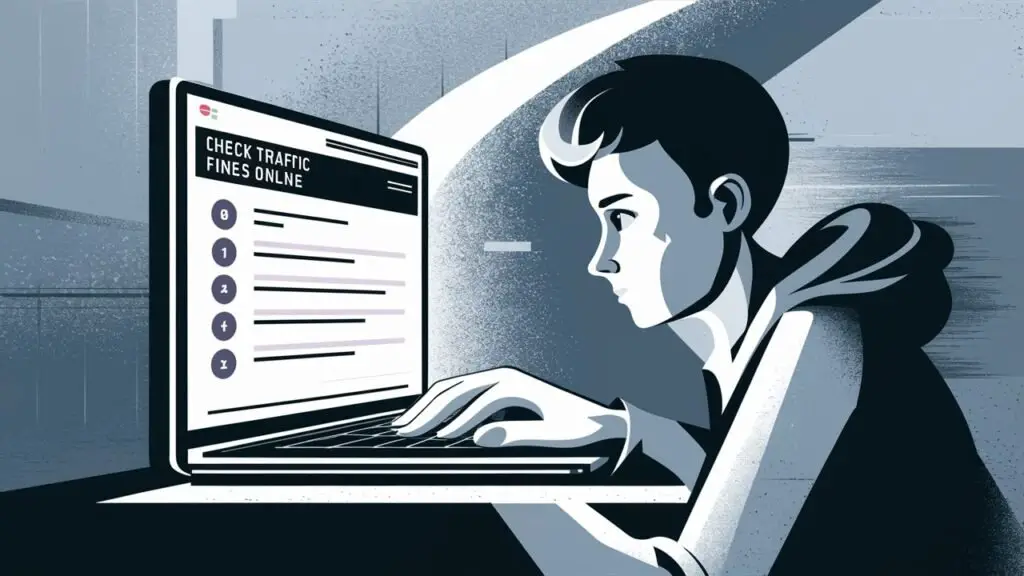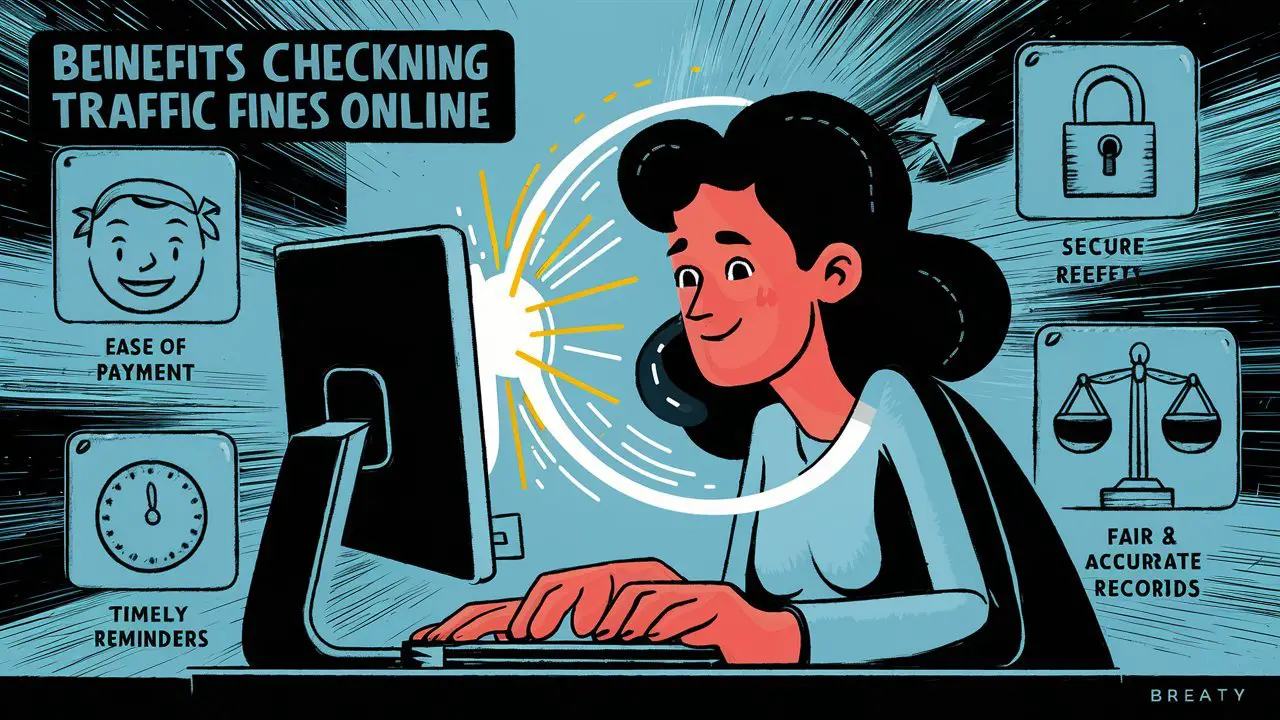You’re cruising down the highway, windows down, music playing, feeling good. Suddenly, a nagging memory surfaces. Did you get a speeding ticket last month? Did you pay for it, or is it gathering dust in a forgotten corner of your glove compartment? The uncertainty can put a damper on your entire day.
Thankfully, those days of frantic phone calls and long courthouse queues are over. Thanks to the internet, Check Traffic Fines Online has become a breeze. Now, you can easily verify your status and settle any outstanding fines from the comfort of your couch (or anywhere with an internet connection!).
This guide will equip you with all the knowledge you need to navigate the online world of traffic fines. From understanding the process to reaping the benefits, you’ll be a pro in no time. So, ditch the anxiety, and let’s get started!
How Do I Check Traffic Fines Online?
Gone are the days of endless hold times and confusing phone menus. Check traffic fines online is a straightforward process that requires minimal effort. Here’s a step-by-step breakdown to get you started:
1. Gather Information: Before diving in, you’ll need some key pieces of information:
- License Plate Number: This is the primary identifier used to search for your outstanding fines.
- Driving License Number: Some online portals may require your driver’s license number for additional verification.
- Ticket Information (Optional): If you have your physical traffic ticket, having the ticket number or reference number can expedite the process.
2. Find the Right Website: The next step depends on your location.
- National Level: Some countries, like India, have a centralized online portal for all traffic fines. Here, “[e-Challan]” serves as a prime example.
- Regional Level: In other regions, dedicated websites managed by local authorities or traffic departments might handle fine inquiries.
3. Search and View Fines: Once you’ve identified the correct website, it’s time to locate your outstanding fines. Most platforms offer a search bar where you can enter your license plate number or driving license number. Follow the on-screen instructions to initiate the search.
4. Understanding Details: Upon successful search completion, you should see a list of your outstanding traffic fines. Here’s what to expect:
- Fine Amount: This displays the total amount owed for each violation.
- Violation Details: This section details the specific traffic offense you committed (e.g., speeding, or running a red light).
- Due Date: Pay close attention to the deadline for settling the fine. Late payments often incur additional fees and penalties.
Benefits of Checking Traffic Fines Online
Let’s face it, dealing with traffic fines isn’t exactly a thrilling experience. However, checking them online offers several advantages that make the process much smoother.
- Convenience: The biggest perk? Accessibility! You can check your fines anytime, anywhere, as long as you have an internet connection. No more squeezing appointments into your busy schedule or waiting in long lines at courthouses.
- Accuracy: Online records are constantly updated, ensuring you have access to the most accurate information about your outstanding fines. This eliminates the risk of outdated phone records or misplaced paperwork leading to confusion.
- Payment Options: In many cases, the online platform allows you to settle your fines directly through the website. This eliminates the need for mailing checks or visiting payment centers, saving you valuable time and effort.
- Record Keeping: Once you’ve paid a fine, your online record serves as a clear and accessible log of past offenses and their settlements.
Read More: Your Guide to Dubai Traffic Fines Discount 2024
Additional Resources and Information
Now that you’re armed with the knowledge of checking traffic fines online, here are some resources to enhance your experience:
- Government Websites: Most government websites have dedicated sections for traffic information, including links to online fine-checking portals. These websites provide valuable information on traffic laws and regulations specific to your region.
- Payment Options: Common online payment methods accepted for traffic fines include credit cards, debit cards, and online bank transfers. Be sure to check the specific website for accepted payment options.
- Dispute Resolution: If you believe a traffic fine is issued in error, most websites offer a process for contesting the fine. This typically involves providing supporting documentation and following established procedures.
Understanding Traffic Fines: A Deeper Dive
Having explored the online checking process and its benefits, let’s delve deeper into the world of traffic fines. This section will equip you with additional knowledge and resources to stay informed and responsible on the road.
Common Traffic Violations: Awareness is key to avoiding traffic fines in the first place. Here’s a list of some of the most common traffic violations that can lead to fines:
- Speeding: Exceeding the posted speed limit is a major traffic violation.
- Disobeying Traffic Signals: Running red lights, failing to yield at stop signs, or ignoring turn signals are all punishable offenses.
- Driving Under the Influence (DUI): Driving while intoxicated is a serious offense with potentially severe consequences, including hefty fines and license suspension.
- Improper Lane Changes: Frequent lane changes without proper signaling pose a safety hazard and can result in fines.
- Parking Violations: Parking in unauthorized zones, exceeding time limits, or blocking traffic can lead to parking tickets.
- Seatbelt Violations: Not wearing a seatbelt is not only unsafe but also attracts fines in most jurisdictions.
Understanding Traffic Fines:
Traffic fines can vary depending on several factors, including:
- The severity of the Violation: More serious offenses like reckless driving or DUI will naturally carry steeper fines compared to minor speeding infractions.
- Location: Fine amounts can differ based on the specific region or jurisdiction where the violation occurred.
- Repeat Offenses: Getting caught for the same violation multiple times often results in progressively higher fines.
Staying Informed:
Staying updated on traffic laws and regulations in your area is crucial. Here are some tips:
- Traffic Department Websites: Most local traffic departments maintain websites that outline traffic laws and associated fines.
- Driver’s Education Courses: Consider taking a refresher driver’s education course to brush up on traffic rules and regulations.
- Local News: Local news outlets might report on changes to traffic laws or ongoing traffic enforcement campaigns.
Conclusion
By now, you should be well-equipped to navigate the world of traffic fines online. Checking your fines regularly is a responsible practice that ensures you stay compliant with traffic regulations and avoid any unnecessary delays or penalties. Remember, a few minutes spent online can save you time, money, and hassle in the long run. So, bookmark this guide, utilize the provided resources, and drive safely!
FAQs
What if I don’t have my traffic ticket information?
Don’t panic! While having your traffic ticket information can expedite the process, most online portals allow searching for fines using your license plate number or driving license number. If that fails, you can always contact your local traffic authority. They can guide you on retrieving your ticket information or checking for outstanding fines based on your personal details.
Is there a fee for checking traffic fines online?
Generally, checking for traffic fines online is a free service. However, some platforms might charge a minimal processing fee if you choose to pay your fines directly through the website using a credit card or debit card. Be sure to review the website’s terms and conditions for any applicable fees.
What happens if I don’t pay my traffic fine?
Ignoring a traffic fine can have serious consequences. Here are some potential outcomes:
- Late Fees: Fines typically accrue late penalties if not paid within the stipulated timeframe.
- License Suspension: Repeated non-payment can lead to the suspension of your driver’s license, making it illegal to operate a vehicle.
- Arrest: In extreme cases, authorities may issue a warrant for your arrest for non-payment of significant fines.
Remember: Taking care of traffic fines promptly is essential to avoid further complications and potential legal trouble.


